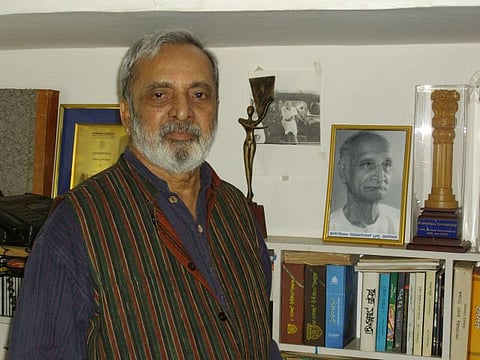

Anisha Sheth | The News Minute | June 12, 2014 | 6.53 pm IST
A case has been registered in a Bangalore court against Kannada writers U R Ananthamurthy and M M Kalburgi for allegedly offending religious sentiments.
The allegedly offensive incident in question happened decades ago, when Ananthamurthy was a child and the book in which he wrote about it, was published 18 years ago.
On Wednesday, Jagan Kumar filed a private complaint with the 7th Additional Chief Metropolitan Magistrate in Bangalore, which has registered a case under Sections 295A and 298 of the Indian Penal Code. Both sections relate to offending religious sentiments.
The case comes after a Kannada news channel telecast a report about scholar and former Vice Chancellor of the Kannada University M M Kalburgi’s comments at a public programme. Speaking at a programme on June 9, Kalburgi had referred to remarks made by Jnanapith awardee U R Ananthamurthy about idol worship in a collection of essays called “Bettale Puje Yake Kudadhu” (roughly translated as “Why nude worship is not acceptable”). The book was published in 1996 and has been re-printed since then.
In an essay in the book, Ananthamurthy recounts a childhood experience in which he urinates on a particular deity of the village, in a bid to challenge his traditional upbringing that everything was sacred. This episode was referred to by Kalburgi when he made the speech at a particular programme.
The context
Ananthamurthy wrote about that childhood experience in an essay titled “Bettale Puje Yake Kudadhu”, in which he discusses the idea of sacredness in the context of the nude-worship ritual performed by Dalits at the Chandraguthi temple in Sorab taluk of Shimoga district. Nude worship was banned by the government in the 1980s.
The statement in question appears on page 39 (in certain editions, and roughly translated as): “I had to breach the Puranic traditions in which I had been brought up. I wanted to ascertain that there was no greater supernatural power than me. So I urinated on the Devva stones of our village. I still remember the fear I had that night. The themes of the stories I wrote in my youth were about the dilemma of transgressing the notion that everything was sacred.”
Writer K Phaniraj says that the overall argument of the essay was that Indian society would always have to deal with different ideas of what is sacred, what is not, and for whom. He says that the overall tone of the essay was to understand the sentiments of the subaltern people.
The complaint
Jagan Kumar (35), a resident of Bangalore, told The News Minute that he had filed the complaint in court because he was offended by the statements. Asked if he had read the essay, Kumar said that he had, and quoted from the relevant portions. He said that urinating on an idol, no matter which type of god it was, had “hurt the sentiments of Hindus”.
Asked about the overall argument in the essay, Kumar said: “Even if he has done it in his childhood, why should he say it? It hurts the sentiments of Hindus. Why should he say that there is no need to fear the idol and that it has no power, no (ability to perform) miracles?”
When pointed out that the book had been in publication for 18 years now, Kumar said: “To be honest, I dint know about the book. I only found out about it when Kalburgi said (it recently during a public programme).”
His lawyer Dharmapal Yennemajal said that the court had accepted the case and that it was posted for hearing of evidence on October 13.